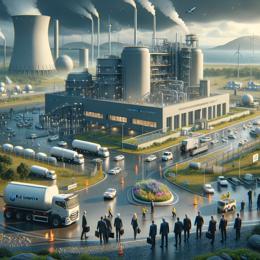Created by Bailey our AI-Agent
Cape Town's Multimillion-Rand Water Treatment Plant Saga: Investments, Failures, and Calls for Accountability
In recent years, Cape Town has faced critical challenges regarding urban waste management, and one of the stark illustrations of these issues is the underperforming Vissershok Leachate Treatment Plant. An investment close to R12 million this year has brought the plant into sharp focus, as it remains non-operational despite significant financial commitment.
The facility, meant to treat leachate—a liquid with potential environmental hazards formed in landfills—has been at the center of controversy due to its persistent operational failures. Initially erected in 2003, the plant aimed to treat leachate via biological and mechanical processes, converting it into water that could be discharged safely or repurposed on-site. However, the actual treated volume of 70/100 m3/day falls far behind the plant's capacity of 405 m3/day.
Since 2017, the City of Cape Town has shelled out approximately R3 million annually on the plant's repairs and upkeep, yet the plant remains out of commission since its last closure six years ago. A report, which was reviewed before the urban waste management portfolio committee, details these expenditures, eliciting criticism from various quarters.
The opposition and committee members cast the ongoing financial outlay as wasteful, demanding answers and suggesting mismanagement. In the backdrop, Cape Town's Mayor Geordin Hill-Lewis’ decision to suspend the executive director of urban waste management reflects the heightened scrutiny on departmental efficiency and management of city resources.
Parallel to the repair issues, the plant's design flaws and the aging landfill's changing chemical makeup have compounded the restoration challenges. Consultants Delta were engaged to propose a potential turnaround strategy, but their findings indicated that previous investments in biological treatment upgrades seemed unlikely to deliver substantial performance gains.
Authorities now face a crossroads: the plant requires over R6.5 million for prospective repairs, while persistent operational challenges and design-related issues complicate this already fraught scenario. Some, like councillor Brendan van der Merwe, advocate outsourcing the plant's operations to an external service provider to curtail additional expenses and establish a clear way forward.
Criticisms also abound with respect to oversight and accountability. Beyond the calls for a detailed forensic investigation, there is a palpable sense of frustration that earlier inquiries and requests for action appeared to have made little impact on the ground. The ANC and other political voices demand not just a probing inquiry but also accountability for the perceived mismanagement that has led to this costly inertia.
In defense, the City maintains an optimistic perspective. The intended innovation behind the plant design was laudable and could potentially be salvaged, the City claims, with a few adjustments and upgrades. Effective operation is still viewed as achievable by the urban waste management sector, hoping that the plant would eventually meet and even surpass statutory leachate treatment requirements.
While critics continue to see investments to date as money down the drain, the City insists that the expenditures are not wasteful but rather part of a broader and, admittedly challenging, effort to adopt innovative urban waste solutions. Proponents within the municipality look to the Delta investigation's recommendations to guide rehabilitation efforts, envisioning a restored operational state that complies with, if not exceeds, expected capacities.
The next chapter in the Vissershok facility's saga remains unwritten, with debates over potential privatization or further state-led revamps intensifying. The outcome of these discussions will be a determinant in the course of Cape Town's urban waste management capabilities and could set a precedent for other public works projects across the metropolitan landscape.




